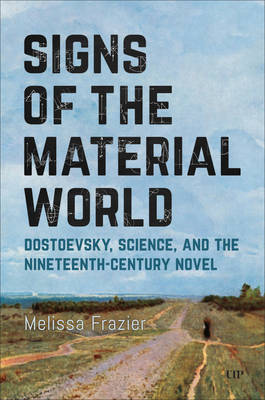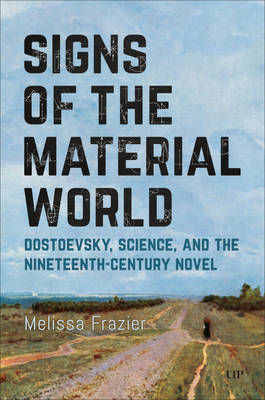
- Afhalen na 1 uur in een winkel met voorraad
- Gratis thuislevering in België vanaf € 30
- Ruim aanbod met 7 miljoen producten
- Afhalen na 1 uur in een winkel met voorraad
- Gratis thuislevering in België vanaf € 30
- Ruim aanbod met 7 miljoen producten
Zoeken
Signs of the Material World
Dostoevsky, Science, and the Nineteenth-Century Novel
Melissa Frazier
Hardcover | Engels
€ 86,45
+ 172 punten
Omschrijving
Signs of the Material World traces the literary effects of nineteenth-century materialism that includes the mind and body within a multifaceted "living life." The book examines a range of scientists, from Auguste Comte and the "vulgar" materialists to Charles Darwin, James Clerk Maxwell, George Henry Lewes, Charles Sanders Peirce, and the Russian Nikolai Strakhov.
The book sets Fyodor Dostoevsky in complex opposition to his fellow writers, Lev Tolstoy and Nikolai Chernyshevsky, while also exploring the formal connections that he shares with contemporaries across Europe and the United States, including Wilkie Collins, Charles Dickens, George Eliot, Nathaniel Hawthorne, and Friedrich Schiller. Melissa Frazier argues that Dostoevsky's art serves as his science, both in his reliance on plot and in his recourse to an often-extravagant figurative language.
This combined literary and scientific practice reflects Dostoevsky's transnational and interdisciplinary reading; it also transforms our own. In George Eliot's words, Dostoevsky "changes the lights for us." Once drawn into his orbit, Eliot herself no longer looks quite the same. Finally, Signs of the Material World argues that Eliot and Dostoevsky's particular strain of nineteenth-century materialism lends itself to an ambivalent political stance, as they both confront the certainties of social utopianism with a deliberate embrace of ambiguity.
The book sets Fyodor Dostoevsky in complex opposition to his fellow writers, Lev Tolstoy and Nikolai Chernyshevsky, while also exploring the formal connections that he shares with contemporaries across Europe and the United States, including Wilkie Collins, Charles Dickens, George Eliot, Nathaniel Hawthorne, and Friedrich Schiller. Melissa Frazier argues that Dostoevsky's art serves as his science, both in his reliance on plot and in his recourse to an often-extravagant figurative language.
This combined literary and scientific practice reflects Dostoevsky's transnational and interdisciplinary reading; it also transforms our own. In George Eliot's words, Dostoevsky "changes the lights for us." Once drawn into his orbit, Eliot herself no longer looks quite the same. Finally, Signs of the Material World argues that Eliot and Dostoevsky's particular strain of nineteenth-century materialism lends itself to an ambivalent political stance, as they both confront the certainties of social utopianism with a deliberate embrace of ambiguity.
Specificaties
Betrokkenen
- Auteur(s):
- Uitgeverij:
Inhoud
- Aantal bladzijden:
- 234
- Taal:
- Engels
Eigenschappen
- Productcode (EAN):
- 9781487560706
- Verschijningsdatum:
- 20/03/2025
- Uitvoering:
- Hardcover
- Formaat:
- Genaaid
- Afmetingen:
- 152 mm x 229 mm
- Gewicht:
- 444 g

Alleen bij Standaard Boekhandel
+ 172 punten op je klantenkaart van Standaard Boekhandel
Beoordelingen
We publiceren alleen reviews die voldoen aan de voorwaarden voor reviews. Bekijk onze voorwaarden voor reviews.











